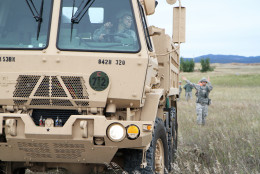Defense
-
In today's Federal Newscast, federal agencies may get tools to hire military and law enforcement spouses as well as veterans quickly for remote positions.
October 13, 2023 -
Tanks, armored vehicles, trucks: The Army buys them all from contractors. But over their sometimes long life cycles, the Army relies on its own production and maintenance facilities. Those make up what the military calls the organic industrial base. At this week's Association of the U.S. Army (AUSA) conference, Federal Drive Host Tom Temin got an in-person, one-on-one update from Brig. Gen. Michael Lalor, the Commander of the Army's Tank-automotive and Armaments Command.
October 13, 2023 -
Now two wars, which the U.S. is helping to supply, put the strain on the defense industrial base
October 12, 2023 -
Army platforms depend on software, and software has to run on the often old or limited hardware mounted aboard ground vehicles.
October 12, 2023 -
In today's Federal Newscast, the Army Enterprise Marketing Office is modernizing its efforts to help reach Generation Z.
October 12, 2023 -
Everywhere you look in the world, you see the use of missiles in military operations. Some by good guys, some of it from bad guys. That is why defending against missiles is a chief mission for the Army. For the United States, missile defense and freedom to operate in space go hand-in-hand.
October 12, 2023 -
In the months following the arrest of Airman 1st Class Jack Teixeira, a member of the Massachusetts Air National Guard, for leaking national security secrets to his friends on Discord, the Defense Department has released new policies and procedures for how it handles classified information.
October 11, 2023 -
In today's Federal Newscast: Some feds in the Evergreen State might soon get a boost in locality pay. The new Army chief of staff targets "the network" as his top modernization priority. And an IT leader for the Marine Corps has moved on.
October 11, 2023 -
In today's Federal Newscast, the Army’s trying to modernize just about everything right now — from helicopters to vehicles to radios. But if it’s going to afford all that, it also needs to get rid of old stuff.
October 10, 2023 -
While generative artificial intelligence and large language models could transform Navy operations, the service’s top technology official is warning that they also could create operational security risks and would require human review.
October 10, 2023 -
Leo Garciga, the Army’s new chief information officer, said accelerating systems move to the cloud, improving the use of DevSecOps and managing and using data better are among his top priorities.
October 09, 2023 -
The Air Force says it increased its childcare staffing levels from 65% to 80% in just one year, mainly through incentives other than pay raises.
October 09, 2023 -
The Army ended finished 2023 with 55,000 new recruits, significantly short of the 65,000 it had aimed for in the fiscal year that ended on Saturday. To help close that gap, the service is implementing several new indicatives, including a rethinking of its recruiting workforce.
October 04, 2023 -
Recent analysis from the Congressional Budget Office found that on average, "enlisted personnel receive cash compensation that is higher than that received by about 90% percent of civilians of the same age and education.” So what's the best way to capitalize on that?
October 03, 2023 -
Cyber companies were left holding the bag of bid and proposals costs to the tune of hundreds of thousands of dollars when the Air Force abruptly cancelled a huge multiple award contract.
October 03, 2023
















